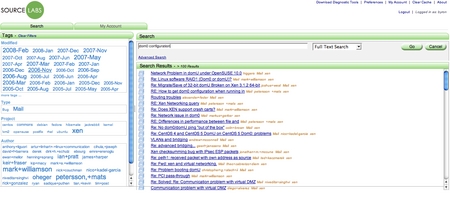Self-support tools work with Java, Linux
Mar 18, 2008 — by LinuxDevices Staff — from the LinuxDevices Archive — views A small start-up based in Seattle has started selling a “self-support” tool for developers working with Java and/or Linux. SourceLabs says its “Self-Support Suite” can quickly identify problems and locate solutions for users of Hibernate, Spring, Struts, Axis, and Tomcat, as well as select Linux applications.
A small start-up based in Seattle has started selling a “self-support” tool for developers working with Java and/or Linux. SourceLabs says its “Self-Support Suite” can quickly identify problems and locate solutions for users of Hibernate, Spring, Struts, Axis, and Tomcat, as well as select Linux applications.
The Suite appears to comprise a database application that sits on the local network, collecting and monitoring syslog data from machines subscribed to the service. Initial rates are $100 for developer PCs, and $400 for “production” application servers.
As it collects syslog output, the server compares each error message, stack trace, core dump, etc., with a master database hosted by SourceLabs. Where likely matches are found, users can be alerted via RSS feeds or emails. Alternatively, users can log into the local server's Apache Lucene and Jetty based web server, and find relevant support data already awaiting them, the company says. Another component of the service is a “swik.net” community site where users can support each other.

SourceLabs's Self-Support Suite's web-based UI
(Click to enlarge)
In addition to the Java applications listed above, the Self Support Suite works with about two dozen high-profile Linux applications — the kernel, xen hypervisor, gcc, GNU C libs, ext2 filesystem, mysql, etc — as well as with the entire OpenSUSE Linux distribution. About 3,000 users participated in an open beta program launched in December of last year, the company said.
In a statement, CEO Byron Sebastian said, “Our technology enables open source professionals to quickly access better information and analytical tools than support vendors have traditionally had at their fingertips.”
SourceLabs claims that mobile phone vendor Motorola is among its early customers.
The service can be evaluated free for 30 days.
This article was originally published on LinuxDevices.com and has been donated to the open source community by QuinStreet Inc. Please visit LinuxToday.com for up-to-date news and articles about Linux and open source.